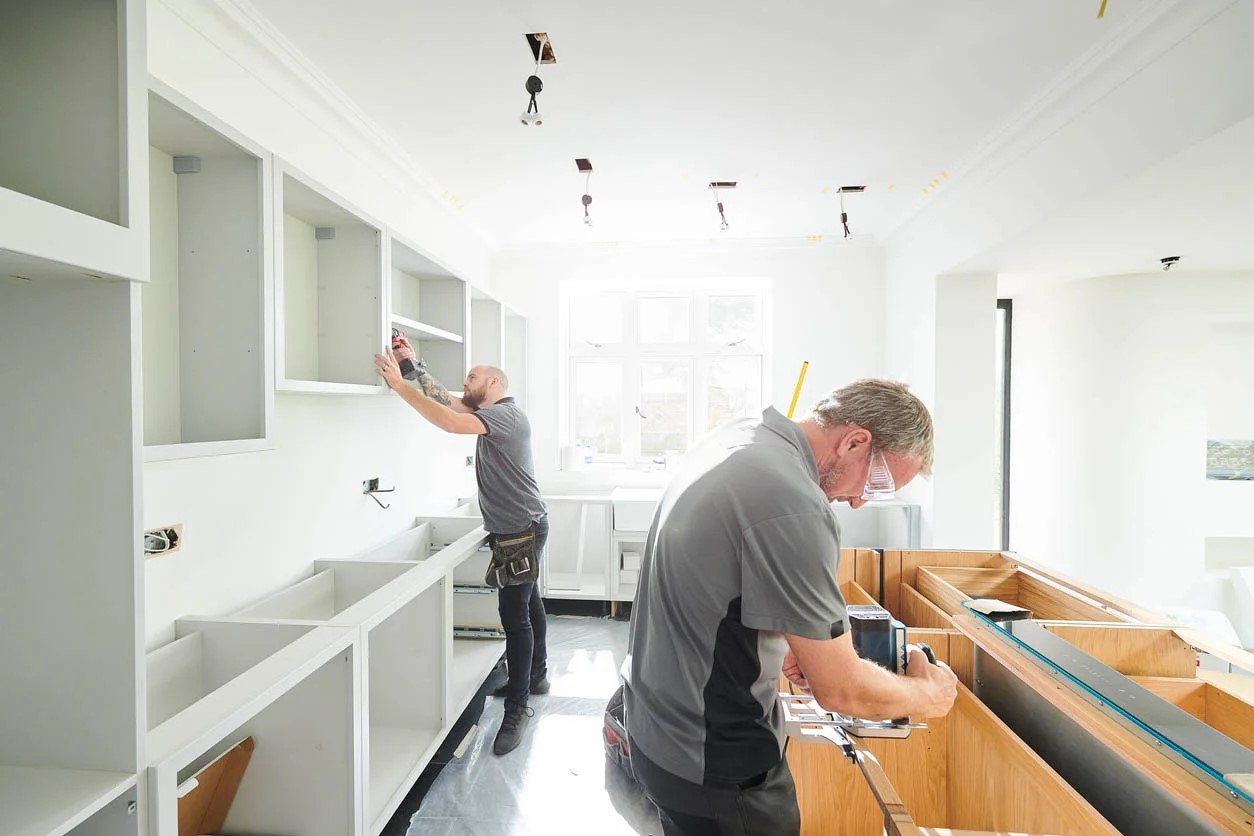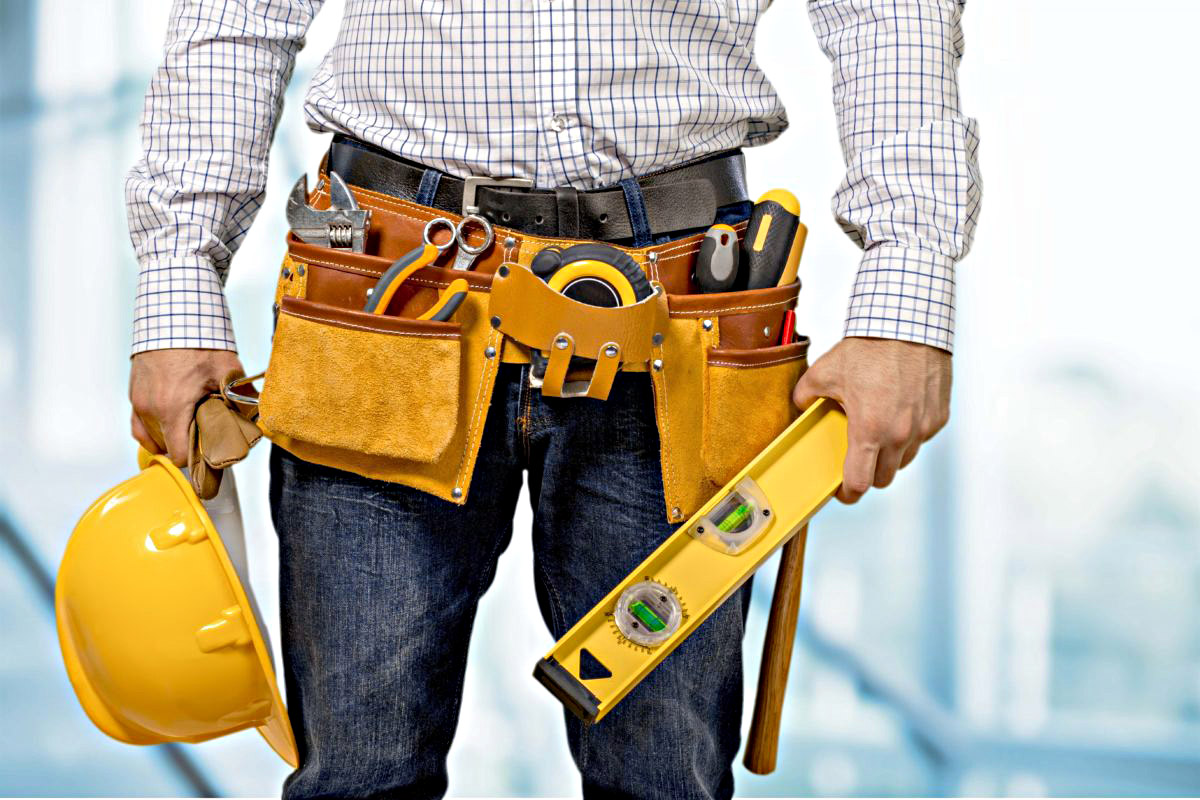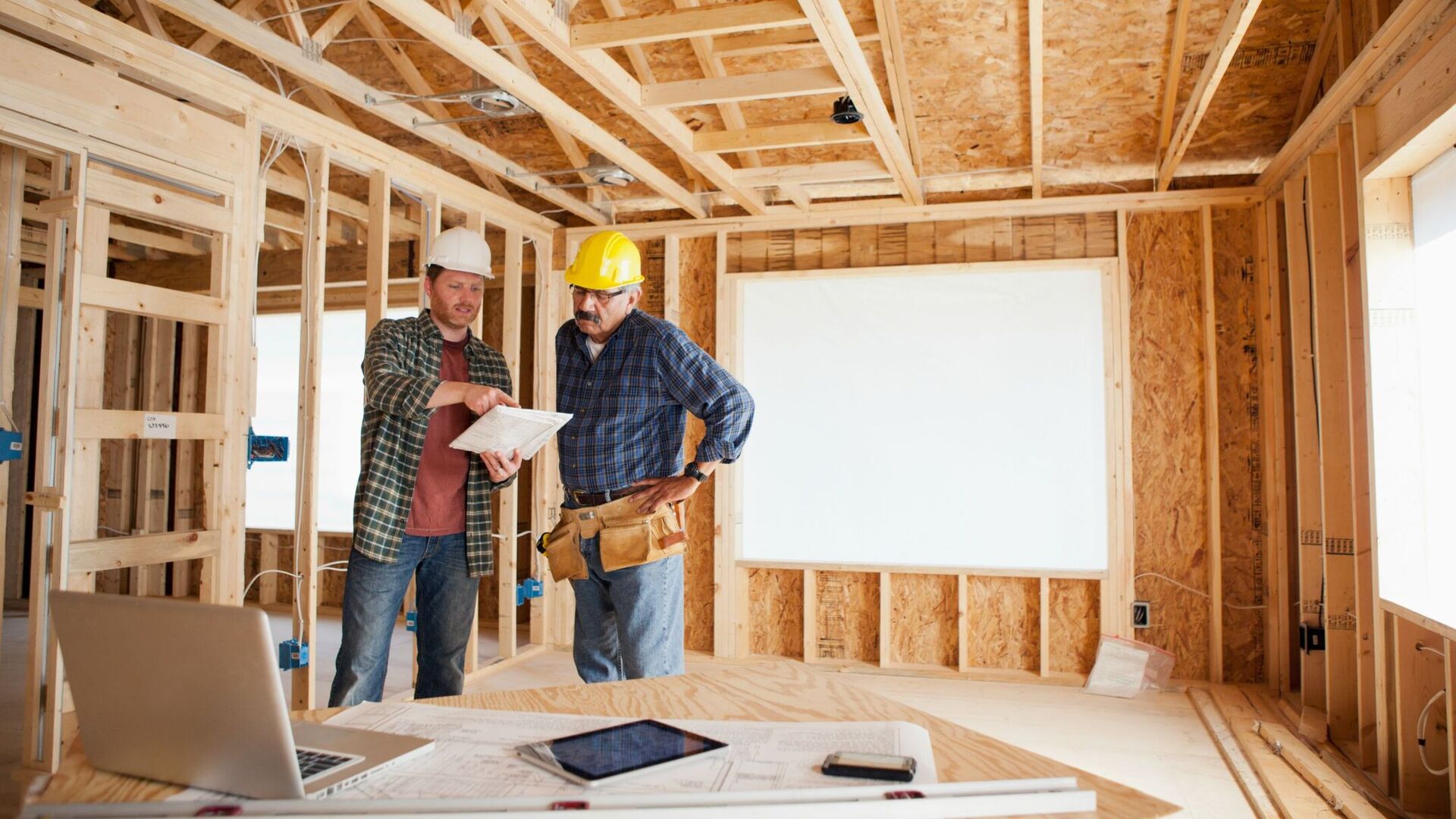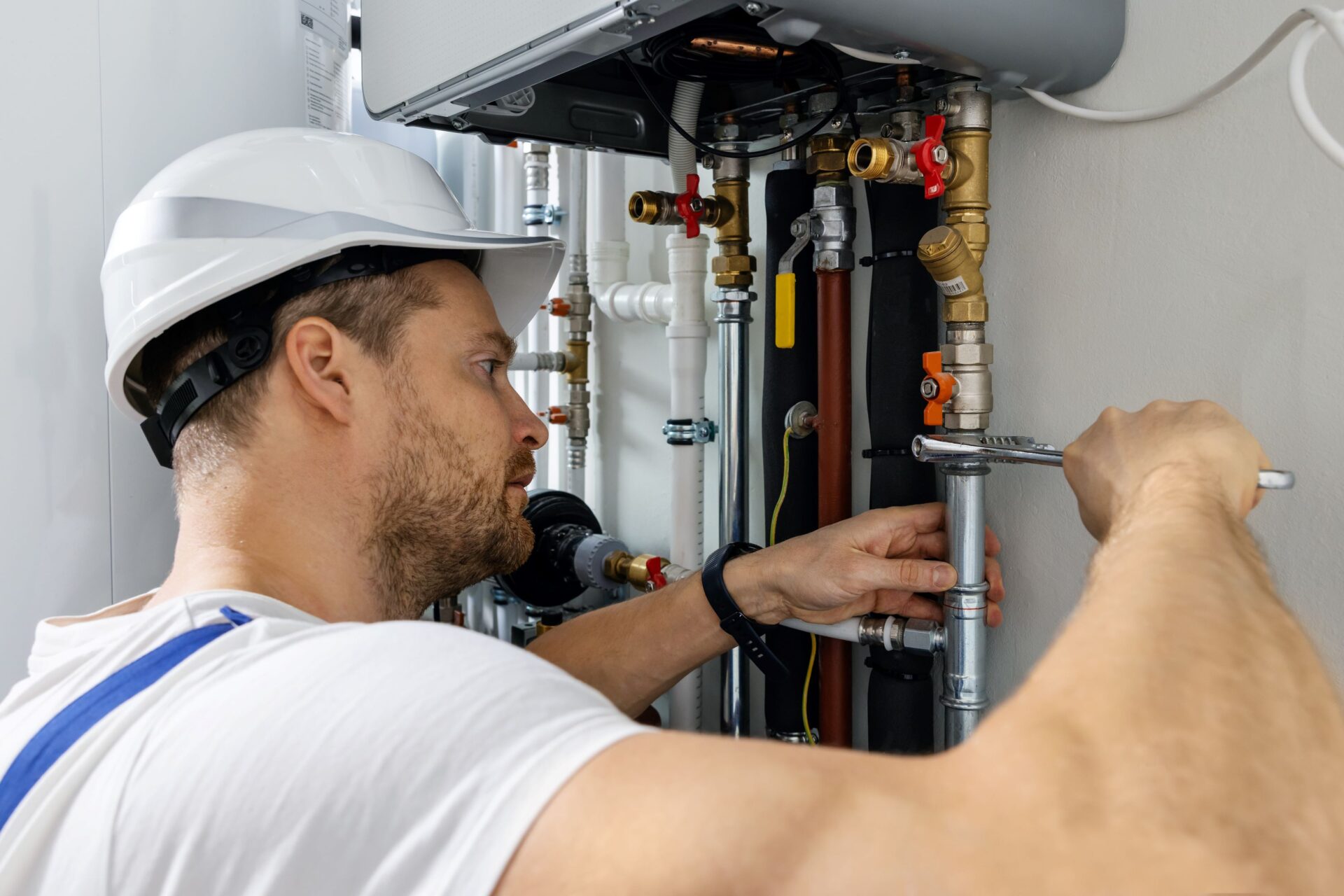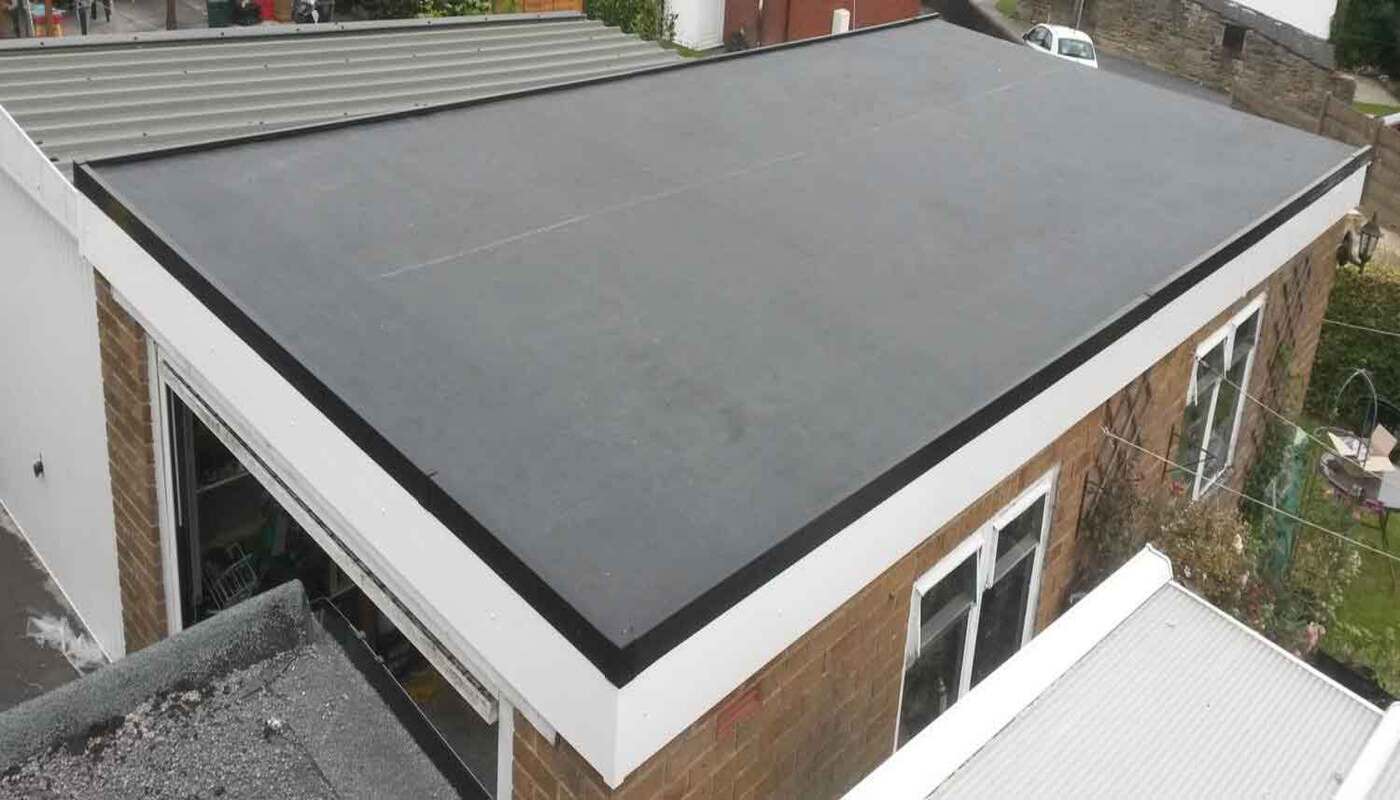Home>Home Maintenance>How To Be A Home Repair Contractor


Home Maintenance
How To Be A Home Repair Contractor
Modified: March 6, 2024
Become a skilled home repair contractor with our step-by-step guide. Learn essential home maintenance techniques and tips to enhance your DIY skills.
(Many of the links in this article redirect to a specific reviewed product. Your purchase of these products through affiliate links helps to generate commission for Storables.com, at no extra cost. Learn more)
Introduction
Welcome to the world of home repair contracting! If you have a knack for fixing things around the house and enjoy working with your hands, becoming a home repair contractor can be a fulfilling and profitable career choice. As a home repair contractor, you will have the opportunity to help homeowners with various maintenance and repair tasks, making their homes safer and more comfortable.
In this article, we will guide you through the steps of becoming a successful home repair contractor. Whether you are just starting out or looking to enhance your existing skills, this comprehensive guide will provide you with the knowledge and insights you need to excel in the industry.
From obtaining the necessary licenses and insurance to developing your skillset, building a network, and managing your finances, we will cover all the essential aspects of being a home repair contractor. You will also learn about the tools and equipment you need, how to handle customer interactions, ensure safety and compliance, troubleshoot common problems, and market and grow your business.
But before we delve into the details, it’s important to mention that success as a home repair contractor requires more than just technical skills. It also demands good communication, organization, and problem-solving abilities. Contractors who continually strive to improve their knowledge and deliver excellent customer service often enjoy long-term success in the industry.
So, if you’re ready to embark on a journey of being a home repair contractor, let’s dive into the first step – getting started.
Key Takeaways:
- Becoming a successful home repair contractor involves obtaining licenses, setting up a business, developing skills, and prioritizing safety and customer service. Continuous learning and adaptation are essential for long-term success.
- Marketing and growing a home repair contracting business requires building a professional brand, leveraging online platforms, providing exceptional customer service, and continually refining marketing strategies. Consistency and adaptability are key to attracting new clients and fostering growth.
Read more: What Is A HVAC Contractor
Getting Started
Starting a career as a home repair contractor may seem daunting, but with the right approach and a solid foundation, you can set yourself up for success. Here are a few key steps to get you started:
- Educate Yourself: Before diving into the world of home repair contracting, it’s important to have a good understanding of the industry. Research the different types of home repairs and maintenance tasks commonly requested by homeowners. Familiarize yourself with building codes and regulations in your area, as adherence to these guidelines is crucial.
- Assess Your Skills: Take stock of your existing skills and knowledge. Identify your strengths and areas where you may need further development. This assessment will help you choose the right path for your career as a home repair contractor.
- Set Goals: Determine what you hope to achieve as a home repair contractor. Are you planning to start your own business or work for an established company? Do you have a specific niche or target market in mind? Setting clear goals will help you stay focused and motivated throughout your journey.
- Obtain Proper Training: While some individuals may have natural handyman skills, it’s still beneficial to undergo specialized training to enhance your expertise. Look for vocational schools, community colleges, or online courses that offer home repair and maintenance programs. These courses can provide you with the necessary knowledge and certification to establish credibility in the field.
- Gain Experience: Building practical experience is crucial for your growth as a home repair contractor. Consider volunteering your services to friends, family, or local nonprofits to gain hands-on experience. This will allow you to build your portfolio and showcase your skills to potential clients.
Remember, starting a career as a home repair contractor is a journey, and it’s important to be patient and persistent. Rome wasn’t built in a day, and neither will your reputation as a skilled contractor. With a strong foundation and a commitment to continuous improvement, you’ll be well on your way to success in the home repair industry.
Becoming Licensed and Insured
One of the most important steps in becoming a home repair contractor is obtaining the necessary licenses and insurance. These credentials not only provide credibility and professionalism but also protect you and your clients in case of accidents or property damage. Here’s what you need to know about becoming licensed and insured:
- Research Licensing Requirements: Start by researching the licensing requirements specific to your area. Each state or region may have different regulations and licensing boards for home repair contractors. Understand the eligibility criteria, exams, and fees associated with obtaining a contractor’s license.
- Prepare for the Licensing Exam: Many licensing boards require contractors to pass an exam to demonstrate their knowledge and understanding of building codes, regulations, and best practices. Study and prepare for the exam by utilizing study guides, attending preparation courses, or taking online practice tests.
- Apply for a Contractor’s License: Once you’re confident in your knowledge and skills, submit your application along with the necessary documentation to the licensing board. This may include proof of experience, education, and passing the licensing exam. Pay the applicable fees as required.
- Obtain Liability Insurance: Liability insurance is essential for home repair contractors. It protects you and your clients in case of accidents, injuries, or property damage that may occur during a project. Consult with insurance providers to determine the coverage needed for your specific services.
- Consider Worker’s Compensation Insurance: If you plan to have employees or subcontractors working under you, worker’s compensation insurance is crucial. This coverage provides protection in case of work-related injuries or illnesses for yourself and your team.
- Maintain Proper Insurance Coverage: As your business grows, periodically review your insurance policies to ensure that they adequately cover your needs. Keep your coverage current and up to date to protect yourself and your clients at all times.
Remember, obtaining the necessary licenses and insurance not only protects you and your clients but also demonstrates your professionalism and dedication to your trade. It’s an investment that instills trust and confidence in your potential customers and sets you apart from unlicensed contractors.
Setting Up Your Business
Once you’ve obtained the necessary licenses and insurance, the next step in becoming a successful home repair contractor is setting up your business. Setting up a solid foundation for your business is crucial for long-term success. Here are some key steps to consider when setting up your home repair contracting business:
- Choose a Business Structure: Decide on the legal structure for your business, such as a sole proprietorship, partnership, limited liability company (LLC), or corporation. Consult with a business attorney or accountant to determine the best structure for your specific circumstances.
- Register Your Business: Register your business with the appropriate government authorities. Obtain any necessary permits or licenses required for operating a business in your area.
- Establish Your Brand: Develop a strong brand identity for your business. This includes creating a memorable business name, logo, and tagline that resonate with your target market. Design professional business cards, brochures, and a website to establish your online presence.
- Set Up a Business Bank Account: Open a separate bank account for your business to keep your personal and business finances separate. This helps with accurate bookkeeping and makes tax filing easier.
- Create a Business Plan: Outline your business goals, target market, competitive landscape, marketing strategies, and financial projections in a comprehensive business plan. This document will serve as a roadmap for your business and can assist you in obtaining financing if needed.
- Develop a Pricing Structure: Determine how you will price your services. Research the market rates in your area and consider factors such as your experience, overhead costs, and profit margins. Establish clear pricing policies and communicate them to your clients.
- Implement Accounting Systems: Set up an effective accounting system to manage your business finances. Utilize accounting software or hire an accountant to track income, expenses, invoices, and taxes.
- Build a Professional Network: Network with other professionals in related industries, such as real estate agents, interior designers, and property managers. Establishing strong relationships can lead to referrals and collaborations, helping you grow your business.
- Invest in Marketing: Develop a marketing strategy to promote your business. Utilize online marketing techniques, such as creating a website, optimizing it for search engines, and engaging on social media platforms. Traditional advertising methods, such as distributing flyers and participating in community events, can also be effective.
- Provide Excellent Customer Service: Always prioritize excellent customer service and strive to exceed your clients’ expectations. Satisfied customers are more likely to recommend you to others, leading to increased business opportunities.
Remember, setting up your business properly lays the groundwork for success in the home repair contracting industry. By establishing a strong brand, implementing effective systems, and providing exceptional service, you’ll be well-positioned for growth and longevity.
Developing Your Skillset
Continual learning and skill development are essential for a home repair contractor. As the industry evolves, it’s crucial to stay ahead of the curve and expand your knowledge and expertise. Here are some tips on developing your skillset as a home repair contractor:
- Attend Training Programs and Workshops: Stay updated with the latest industry trends and techniques by attending training programs and workshops. These educational opportunities provide hands-on experience, networking opportunities, and the chance to learn from industry experts.
- Take Advantage of Online Resources: Online platforms offer a wealth of resources for home repair contractors. Take advantage of video tutorials, blogs, forums, and online courses to enhance your skills and learn new techniques. Platforms such as YouTube, Skillshare, and Udemy offer a wide range of home repair courses.
- Specialize in a Niche: Consider specializing in a specific area of home repair to differentiate yourself from competitors. Specializing allows you to become an expert in that particular field and attract clients who require specialized services.
- Stay Up to Date with Building Codes and Regulations: Building codes and regulations may change over time. Stay informed about any updates or changes relevant to your industry to ensure that your work is in compliance with current standards.
- Learn from Experienced Contractors: Engage with experienced home repair contractors and learn from their knowledge and expertise. Seek mentorship opportunities or join professional organizations to expand your network and learn from those who have already found success in the industry.
- Practice Continuous Improvement: Treat every project as an opportunity to improve your skills. Reflect on each job, evaluate your performance, and identify areas where you can enhance your efficiency and quality of work.
- Stay Informed about New Tools and Technologies: The home repair industry is constantly evolving, with new tools and technologies emerging. Stay updated with the latest advancements and invest in tools and equipment that can improve your efficiency and expand your capabilities.
- Seek Feedback from Clients: Regularly seek feedback from your clients to identify areas of improvement. Actively listen to their suggestions and implement changes that can enhance your service and customer satisfaction.
- Join Professional Associations: Consider joining professional associations or trade organizations associated with home repair contracting. These groups often provide resources, educational opportunities, and networking events that can help you stay connected and grow in your profession.
- Set Personal Goals for Skill Development: Continually set personal goals for skill development. Challenge yourself to learn new techniques, master challenging repairs, or expand your knowledge in a specific area. Regularly assess your progress and adjust your goals accordingly.
Remember, skill development is an ongoing process. Embrace the opportunity to learn and improve your skills, and always strive for excellence in your work. By continuously developing your skillset, you’ll enhance your reputation as a competent and reliable home repair contractor.
Building Your Network
Building a strong professional network is essential for the success of any home repair contractor. A solid network can open doors to new opportunities, provide valuable insights, and generate referrals. Here are some strategies to help you build and grow your network:
- Attend Industry Events: Attend trade shows, conferences, and industry events related to home repair and contracting. These events allow you to connect with other professionals, stay updated on the latest trends, and build relationships with potential clients or collaborators.
- Join Professional Associations: Become a member of professional associations and trade organizations for home repair contractors. These organizations offer networking opportunities, educational resources, and access to industry updates. Active involvement in these associations can help you establish credibility and connect with like-minded professionals.
- Participate in Community Events: Get involved in community events and local initiatives. Volunteering for community projects can introduce you to potential clients and community members who may require your services. It also demonstrates your commitment to giving back to the community.
- Collaborate with Other Contractors: Build relationships with other professionals in related fields, such as plumbers, electricians, or HVAC technicians. Collaborating with these contractors can lead to referrals and partnerships, allowing you to offer comprehensive services to your clients.
- Network Online: Utilize social media platforms and online forums to connect with other professionals in the industry. Join relevant groups on platforms like LinkedIn or Facebook and actively engage in discussions, share insights, and offer assistance. Online networking allows you to connect with professionals beyond your immediate geographic location, expanding your reach.
- Attend Local Business Networking Events: Seek out local business networking events in your community. These events provide opportunities to meet other professionals from various industries, including real estate agents, property managers, and interior designers. Building relationships with these individuals can lead to referrals and collaborations.
- Ask for Client Testimonials and Referrals: Satisfied clients can be powerful advocates for your business. Ask your clients for testimonials or referrals, which can help you build trust with potential clients. Encourage happy clients to leave online reviews, as positive reviews can greatly influence the decision-making process of future clients.
- Stay in Touch: Maintain regular communication with your network by sending follow-up emails, newsletters, or just checking in to see how they are doing. Staying top-of-mind with your connections can lead to future collaborations or referrals.
- Offer Your Expertise: Share your knowledge and expertise by offering to speak at industry events or local community centers. By showcasing your skills and providing valuable information, you can establish yourself as a trusted authority in your field.
- Be Genuine and Helpful: Building a network is not just about self-promotion; it’s about forming meaningful connections. Be genuine in your interactions, show a sincere interest in others, and be willing to help when you can. Building trust and fostering mutually beneficial relationships will strengthen your network over time.
Remember, building a network takes time and effort. Be proactive in your networking efforts, and always be professional and courteous. A strong network can lead to new business opportunities, collaborations, and a fulfilling career as a home repair contractor.
Estimating and Bidding on Projects
Accurate and competitive estimating is crucial for a home repair contractor. It helps you secure projects, ensure profitability, and build trust with your clients. Here are some key steps to consider when estimating and bidding on projects:
- Assess the Scope of Work: Carefully review the project requirements and evaluate the scope of work. Take note of all the tasks involved, including materials, labor, permits, and additional expenses.
- Calculate Material Costs: Compile a detailed list of materials needed for the project. Research prices from multiple suppliers to ensure accuracy. Consider factors such as quality, availability, and delivery costs when selecting materials.
- Estimate Labor Costs: Determine the amount of time required to complete the project and calculate the labor costs accordingly. Take into account factors such as the complexity of the task, the number of workers needed, and any specialized skills required.
- Consider Overhead Costs: Factor in your overhead costs, such as rent, insurance, utilities, and advertising expenses. These costs should be spread across all your projects to ensure profitability.
- Include Markup for Profit: Don’t forget to include a markup for profit in your estimate. This ensures that you are compensated for your expertise, time, and the risk associated with the project.
- Get Multiple Quotes: If subcontractors or suppliers are involved in the project, obtain multiple quotes to compare prices and ensure you’re getting the best value for your money. Don’t solely focus on price; also consider reputation, reliability, and quality of work.
- Create a Comprehensive Proposal: Develop a detailed proposal that includes a breakdown of costs, project timeline, and any specific terms and conditions. Clearly communicate your approach, expertise, and the benefits of choosing your services. Make sure the proposal is professional, well-organized, and easy for the client to understand.
- Present Your Bid: Schedule a meeting with the client to present your bid and proposal. Clearly explain your estimate, addressing any questions or concerns the client may have. Emphasize the value you provide and why you are the best choice for the project.
- Follow Up and Negotiate: If the client has concerns or queries about your bid, be open to negotiation. Understand their needs and be willing to make adjustments where possible. Maintain open lines of communication and address any objections promptly and professionally.
- Review and Learn: After completing a project, review your actual costs and compare them to your initial estimate. Analyze any discrepancies and identify areas for improvement in future estimates. Continuous learning and refining your estimating process will help you become more accurate and efficient over time.
Remember, accurate estimating and effective bidding are crucial skills for a successful home repair contractor. By carefully assessing the project requirements, calculating costs accurately, and presenting a professional proposal, you’ll position yourself as a reliable and trustworthy contractor in the eyes of your clients.
Managing Finances
Effective financial management is essential for the success and sustainability of any business, including a home repair contracting business. Proper management of your finances ensures that you are profitable, able to meet your financial obligations, and can plan for future growth. Here are some key tips for managing your finances as a home repair contractor:
- Create a Budget: Establish a budget that outlines your projected income and expenses. Consider all costs, including materials, labor, overhead expenses, marketing, and taxes. Having a clear budget helps you track your financial health and make informed decisions.
- Track and Monitor Expenses: Keep meticulous records of all your business expenses. Use accounting software or hire an accountant to track and categorize your expenses accurately. This enables you to identify areas where you can cut costs or optimize spending.
- Invoice Promptly and Follow Up: Send out your invoices in a timely manner and follow up on any outstanding payments. Adopt a systematic approach to invoicing and implement reminders for overdue payments to maintain steady cash flow.
- Separate Business and Personal Finances: Open a separate bank account for your business and avoid mixing personal and business expenses. Clearly separate your personal and business finances to ensure accurate bookkeeping and to ease tax filing.
- Handle Taxes Properly: Familiarize yourself with the tax laws and regulations that apply to your business. Set aside money for taxes regularly, and consider working with a tax professional to ensure compliance and maximize deductions.
- Manage Cash Flow Effectively: Cash flow management is crucial for the stability of your business. Analyze your income and expenses to ensure that you have enough funds to cover your obligations. Implement strategies such as offering discounts for early payments or negotiating extended payment terms with suppliers to optimize your cash flow.
- Plan for Seasonal or Fluctuating Workloads: Home repair contracting can have seasonal variations in workload. Plan and budget accordingly to manage any financial gaps during slower periods. Explore additional services or alternate income streams during off-peak seasons to maintain a stable cash flow.
- Save for Emergencies and Business Growth: Set aside a portion of your income for emergencies and future business growth. Having reserves allows you to navigate unexpected expenses or take advantage of growth opportunities without jeopardizing your financial stability.
- Evaluate Pricing and Profitability: Regularly review your pricing structure and profitability. Analyze your costs, competition, and market demand to ensure that your pricing is fair, competitive, and sustainable. Adjust your prices if necessary to maintain profitability.
- Invest in Professional Advice: Consider working with a financial advisor or accountant who specializes in small businesses. They can provide valuable insights on financial management, tax planning, and long-term financial strategies.
Remember, effective financial management is crucial for the success of your home repair contracting business. By implementing proper budgeting, expense tracking, and cash flow management strategies, you’ll have a solid financial foundation that supports growth and profitability.
Always prioritize safety when working on home repairs. Use proper protective gear, follow safety guidelines, and be aware of potential hazards to prevent accidents.
Tools and Equipment
As a home repair contractor, having the right tools and equipment is essential for completing projects efficiently and delivering high-quality workmanship. Here are some key considerations when it comes to selecting and maintaining your tools and equipment:
- Identify Essential Tools: Determine the essential tools needed for your specific area of home repair contracting. These may include hand tools such as screwdrivers, hammers, wrenches, and pliers, as well as power tools like drills, saws, and sanders.
- Invest in Quality: Quality tools may cost more initially but will save you money in the long run. High-quality tools are more durable, perform better, and are less likely to break or malfunction during critical tasks.
- Consider Ergonomics: Choose tools and equipment that are comfortable to use for extended periods. Ergonomic designs ensure less strain on your body, reducing the risk of injuries and enhancing your productivity.
- Maintain and Upgrade: Regularly inspect and maintain your tools and equipment to keep them in optimal condition. Clean and lubricate them as recommended by the manufacturer. Replace worn-out or damaged tools promptly to avoid compromising the quality of your work.
- Care for Safety: Prioritize safety when selecting tools and equipment. Ensure they meet safety standards and have necessary safety features. Use personal protective equipment (PPE) such as gloves, safety goggles, ear protection, and masks when required.
- Consider Specialty Tools: Depending on your area of specialization, you may need specialty tools. These may include electrical testing equipment, pipe wrenches, tile saws, or specific tools for HVAC or plumbing work. Evaluate your projects and invest in the tools that will enhance your capabilities.
- Portable and Versatile Options: If you need to work in various locations, consider portable and versatile options for your tools and equipment. Look for lightweight and compact tools or consider investing in tool kits that provide a comprehensive selection of commonly used tools.
- Stay Updated with Technology: Embrace technology advancements in the home repair industry. Explore power tools with cordless capabilities, digital measuring devices, and software for project management, cost estimation, and 3D modeling. These advancements can increase your efficiency and accuracy.
- Upgrade with Safety and Efficiency Features: When replacing old tools or investing in new ones, consider models that have safety and efficiency features. Look for tools with anti-kickback systems, adjustable speed controls, LED lights, or ergonomic handles that enhance both safety and performance.
- Consider Tool Insurance and Warranties: Protect your investment by considering tool insurance. This coverage can help replace stolen or damaged tools. Additionally, check the warranties offered by manufacturers and suppliers to ensure you are covered in case of defects or malfunctions.
Remember, having the right tools and equipment is crucial for your success as a home repair contractor. The right tools not only enhance your efficiency but also reflect your professionalism and commitment to delivering top-quality workmanship. Invest wisely, maintain your tools regularly, and stay updated with industry advancements to ensure that you always have the necessary tools for the job.
Handling Customer Interactions
Effective communication and excellent customer service are key to building trust and maintaining long-term relationships with your clients as a home repair contractor. Here are some tips for handling customer interactions with professionalism and care:
- Active Listening: Take the time to listen attentively to your clients. Understand their needs, concerns, and expectations. Ask probing questions to clarify any uncertainties and demonstrate that you value their input.
- Clear Communication: Communicate clearly and concisely with your clients. Use simple language, avoiding jargon or technical terms that they may not understand. Keep them informed about the project timeline, progress, and any unexpected delays or changes.
- Manage Expectations: Be transparent about what can be realistically achieved within the project scope and timeline. Set clear expectations with your clients to avoid misunderstandings or disappointments.
- Timely Responses: Respond to client inquiries and requests promptly. Whether it’s answering calls, replying to emails, or addressing concerns, timely communication shows your commitment to providing excellent customer service.
- Professionalism: Conduct yourself with professionalism in all interactions. Be punctual, dress appropriately, and maintain a respectful and courteous demeanor. Treat your clients’ homes with care and cleanliness, always leaving the work area tidy.
- Flexibility and Adaptability: Be flexible and adaptable to accommodate your clients’ preferences and schedules. Offer options and alternatives when necessary, demonstrating your willingness to work with them to find the best solution.
- Address Complaints Promptly: If a client expresses dissatisfaction or raises a complaint, take it seriously and address it promptly. Listen to their concerns, apologize if necessary, and work towards finding a resolution that satisfies both parties. Handling complaints effectively can turn a negative experience into a positive one.
- Provide Regular Updates: Keep your clients informed about the progress of their project. Regularly update them on milestones, any unexpected issues encountered, and the timeline for completion. Regular communication builds trust and reassures your clients that their project is a priority for you.
- Follow Through on Commitments: Honor your commitments and promises to your clients. Deliver on agreed-upon timelines and ensure the quality of your workmanship. Going above and beyond to meet or exceed their expectations will leave a lasting positive impression.
- Seek Feedback and Reviews: Request feedback from your clients upon project completion. Ask for honest reviews and testimonials to showcase your expertise and customer satisfaction. Positive reviews can greatly influence potential clients in their decision-making process.
Remember, happy and satisfied clients are more likely to recommend your services and become repeat customers. By prioritizing effective communication, listening to their needs, and providing exceptional customer service, you can build a strong reputation as a trusted home repair contractor.
Handling Home Repair Projects
As a home repair contractor, successful project management is essential to ensure smooth operations and customer satisfaction. Here are some key tips for handling home repair projects efficiently and effectively:
- Thoroughly Assess the Project: Conduct a comprehensive assessment of the project and understand the scope of work. This includes evaluating the necessary materials, equipment, and labor required.
- Create a Detailed Plan: Develop a detailed plan for each project, outlining the timeline, tasks, and milestones. Break down the project into smaller manageable steps to ensure a systematic and organized approach.
- Secure Necessary Permits: Determine if any permits or inspections are required for the project. Research local regulations and obtain the necessary permits to ensure compliance and avoid potential legal issues.
- Manage Materials and Supplies: Procure the required materials and supplies in advance. Ensure they are of high quality and meet the project specifications. Keep track of inventory to avoid delays or shortages during the project.
- Coordinate Efficient Scheduling: Develop a schedule that allows for efficient use of time and resources. Coordinate with subcontractors, suppliers, and other team members to ensure smooth workflows and minimize downtime.
- Maintain Open Communication: Regularly communicate with your client and provide updates on the project’s progress. Address any concerns or issues promptly to avoid misunderstandings and build trust.
- Monitor Budget and Expenses: Keep a close eye on the project budget and track expenses to ensure profitability. Monitor costs and make necessary adjustments to stay within the allocated budget.
- Manage Changes and Scope Creep: Scope creep refers to unplanned changes or additions to the original project scope. Clearly communicate any proposed changes to the client and obtain their approval before proceeding. Keep detailed records of all changes to avoid disputes or misunderstandings later on.
- Maintain Quality and Attention to Detail: Focus on delivering high-quality workmanship and attention to detail. Strive to exceed your client’s expectations by ensuring proper installation, precise measurements, and thorough finishing. A commitment to quality will set you apart from competitors.
- Ensure Safety and Compliance: Prioritize safety on the job site by adhering to appropriate safety protocols. Use personal protective equipment (PPE), implement safety measures, and follow local building codes and regulations. Regularly inspect tools and equipment for safety and maintain a clean and hazard-free work environment.
- Document and Evaluate: Keep detailed records of each project, including contracts, permits, communication logs, and financial records. Review completed projects to identify areas for improvement and apply lessons learned to future projects.
Remember, effective project management is crucial for home repair contractors. By efficiently managing resources, maintaining open communication, and delivering high-quality work, you can ensure a successful and satisfying outcome for both you and your clients.
Safety and Compliance
As a home repair contractor, prioritizing safety and compliance is of utmost importance. Not only does it protect you and your team from accidents and injuries, but it also ensures that your work meets the required standards and regulations. Here are key tips for maintaining safety and compliance on your job sites:
- Know and Follow Safety Guidelines: Familiarize yourself with safety guidelines and regulations specific to your area. Stay updated on industry best practices and follow safety protocols at all times. This includes using personal protective equipment (PPE) such as hard hats, safety glasses, gloves, and respirators.
- Perform Risk Assessments: Conduct risk assessments before starting any project. Identify potential hazards and develop strategies to mitigate risks. Communicate these risks to your team and take necessary precautions to ensure a safe working environment.
- Implement Proper Training: Ensure that you and your team have the necessary training and certifications for the tasks at hand. Stay up to date with the latest training requirements and provide ongoing training to your employees to refresh their knowledge and skills.
- Use Proper Tools and Equipment: Utilize appropriate and well-maintained tools and equipment for each job. Inspect your tools regularly for wear and tear, and replace or repair them as needed. Follow manufacturer guidelines for tool usage and safety measures.
- Secure Necessary Permits and Licenses: Before starting any project, ensure that you have obtained the necessary permits and licenses as required by local authorities. This helps ensure compliance with building codes and regulations, and avoids potential legal issues.
- Practice Good Housekeeping: Maintain a clean and organized work environment to minimize tripping hazards and clutter. Properly store tools and materials, and promptly remove debris from the work area.
- Communicate Safety Procedures: Clearly communicate safety procedures and protocols to your team. Hold regular safety meetings to review safety guidelines, discuss any new risks, and address any concerns or questions raised by your team members.
- Regularly Inspect Job Sites: Regularly inspect job sites to identify and address potential safety hazards. This includes checking for proper installation of guardrails, ensuring proper ventilation in enclosed spaces, and identifying any electrical or structural risks.
- Encourage Open Communication: Encourage your team to report any safety concerns or near misses promptly. Foster a culture of open communication where everyone feels comfortable speaking up about potential safety issues.
- Maintain Insurance Coverage: Protect yourself and your business by maintaining appropriate insurance coverage. General liability insurance, workers’ compensation insurance, and tool/equipment insurance are essential to safeguard against potential accidents or damages.
- Stay Informed about Regulations and Updates: Regularly update your knowledge on safety regulations and stay informed about any changes or updates in the industry. Attend seminars, training programs, and industry conferences to stay up to date with the latest safety standards.
Remember, safety and compliance are integral to your success as a home repair contractor. By prioritizing safety, following regulations, and maintaining a commitment to ongoing training and education, you can protect your team, clients, and business while delivering top-notch service.
Troubleshooting and Problem-Solving
As a home repair contractor, encountering problems and challenges is inevitable. Mastering the art of troubleshooting and problem-solving is crucial for effectively resolving issues that arise during projects. Here are some key tips to help you navigate and overcome challenges:
- Conduct Thorough Assessments: When faced with a problem, conduct a thorough assessment of the situation. Identify the root cause of the issue and gather all relevant information to form a clear understanding of the problem.
- Stay Calm and Analytical: Keep a calm and composed mindset when faced with challenges. Approach the problem analytically, breaking it down into smaller components to identify potential solutions.
- Consult Reference Materials: Utilize reference materials and resources to aid in troubleshooting. Industry-specific manuals, online forums, and discussion boards can provide valuable insights and solutions to common problems.
- Collaborate and Seek Expert Advice: If you encounter a complex problem, don’t hesitate to seek help and advice from experts or more experienced professionals in the field. Collaborating with others can offer fresh perspectives and innovative solutions.
- Think Outside the Box: Be open to exploring unconventional solutions. Thinking creatively and approaching the problem from different angles can lead to innovative and effective solutions.
- Consider Cause and Effect: Analyze the cause and effect relationship of the problem. Understanding how one action or event impacts the others can help identify potential solutions and prevent future occurrences.
- Test and Evaluate Solutions: Implement potential solutions and test their effectiveness. Assess the outcomes and make adjustments as needed. Keep detailed records of the troubleshooting process for future reference.
- Prioritize Safety: Safety should always be a top priority when troubleshooting problems. Assess any potential risks and take appropriate measures to mitigate them before attempting any solutions.
- Communicate with Clients: Keep your clients informed about any challenges that may arise during the project. Update them on your troubleshooting efforts and proposed solutions to maintain transparency and manage their expectations.
- Document Lessons Learned: Keep a record of the problems encountered and the steps taken to resolve them. Documenting lessons learned allows you to build a knowledge base that can be referenced for future projects.
- Continuously Improve: Reflect on the troubleshooting process after each project, identifying areas for improvement. Continuously learn from your experiences and seek to enhance your problem-solving skills.
Remember, troubleshooting and problem-solving are essential skills for a home repair contractor. Developing these skills not only enhances your ability to handle challenges but also strengthens your reputation as a reliable and competent professional in the industry.
Marketing and Growing Your Business
Effective marketing plays a crucial role in growing your home repair contracting business. It helps you reach a wider audience, attract new clients, and build a strong brand reputation. Here are some key strategies to help you market and grow your business:
- Create a Professional Brand: Develop a professional and memorable brand identity for your business. This includes designing a logo, choosing a color scheme, and creating marketing materials that reflect your expertise and professionalism.
- Build a Professional Website: Establish an online presence with a well-designed and informative website. Highlight your services, showcase your portfolio, and include testimonials from satisfied clients. Ensure that your website is user-friendly, mobile-responsive, and optimized for search engines.
- Optimize Search Engine Visibility: Implement search engine optimization (SEO) techniques to enhance your website’s visibility in search engine results. Research relevant keywords and incorporate them strategically into your website content, meta tags, and headings.
- Utilize Social Media: Leverage social media platforms to engage with potential clients and showcase your expertise. Create business profiles on platforms like Facebook, Instagram, and LinkedIn, and share relevant content, project updates, and tips and tricks related to home maintenance.
- Develop a Referral Program: Encourage satisfied clients to refer your services to their friends, family, and colleagues. Consider implementing a referral program that rewards clients who refer new business to you with discounts or incentives.
- Network and Collaborate: Attend industry events, join local business organizations, and network with other professionals in related fields. Collaborate with real estate agents, interior designers, or property managers to expand your reach and attract new clients.
- Offer Exceptional Customer Service: Provide outstanding customer service to every client you work with. Focus on building long-term relationships by ensuring clear communication, being responsive to inquiries, and exceeding expectations with your quality of work.
- Showcase Your Expertise through Content: Establish yourself as an authority in your field by creating and sharing valuable content. Write blogs, create video tutorials, or host webinars that provide home maintenance tips and highlight your expertise. Share this content on your website and social media platforms.
- Collect and Display Testimonials and Reviews: Request feedback and reviews from satisfied clients, and display them prominently on your website and social media platforms. Positive testimonials from happy clients can greatly influence potential customers’ decision-making process.
- Optimize Online Directories: Ensure that your business is listed accurately on online directories and review platforms such as Google My Business, Yelp, and Angie’s List. Encourage satisfied clients to leave reviews, as positive online reviews can attract new clients.
- Invest in Online Advertising: Consider paid online advertising to increase your visibility and reach. Utilize platforms such as Google Ads or social media advertising to target your ideal audience and drive traffic to your website.
- Stay Updated with Industry Trends: Continuously educate yourself on the latest industry trends, techniques, and advancements in home repair. Attend seminars, workshops, and trade shows to stay ahead of the curve and offer innovative solutions to your clients.
- Monitor and Evaluate Marketing Efforts: Regularly analyze the success of your marketing strategies and campaigns. Use website analytics, track leads, and measure the return on investment (ROI) to determine the effectiveness of your marketing initiatives. Adjust your strategies as needed based on the insights gained.
Remember, marketing is an ongoing process that requires consistency and adaptability. By focusing on building a strong brand, leveraging online platforms, providing exceptional customer service, and continually refining your marketing strategies, you can attract new clients and grow your home repair contracting business.
Conclusion
Congratulations! You’ve reached the end of this comprehensive guide on becoming a successful home repair contractor. By following the steps outlined in this article, you will be well-equipped to tackle the challenges and opportunities that come your way.
From obtaining the necessary licenses and insurance to setting up your business, developing your skillset, and building a strong network, every aspect of your journey as a home repair contractor has been covered. You have learned how to estimate and bid on projects, manage your finances, select the right tools and equipment, handle customer interactions, and troubleshoot common issues that may arise.
Remember, an essential part of being a successful home repair contractor is to continuously evolve and adapt. Stay up to date with industry trends, embrace new technologies, and invest in your professional development. By continually improving your skills and knowledge, you’ll stay ahead of the competition and provide top-notch service to your clients.
Equally important is building a strong reputation through exceptional customer service, open communication, and a commitment to safety and compliance. By prioritizing these aspects, you’ll foster long-lasting client relationships, garner positive reviews, and generate referrals for future projects.
As you embark on your journey as a home repair contractor, have confidence in your abilities and never stop learning. With each project, embrace the opportunity to grow both personally and professionally.
Lastly, remember to take pride in your work. Through your dedication, skill, and passion for what you do, you have the power to transform houses into homes and make a lasting impact on the lives of homeowners.
Good luck on your journey as a home repair contractor! May it be filled with success, growth, and fulfillment.
Frequently Asked Questions about How To Be A Home Repair Contractor
Was this page helpful?
At Storables.com, we guarantee accurate and reliable information. Our content, validated by Expert Board Contributors, is crafted following stringent Editorial Policies. We're committed to providing you with well-researched, expert-backed insights for all your informational needs.


